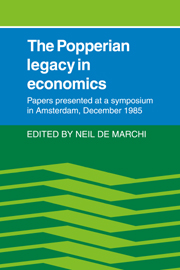Book contents
- Frontmatter
- Contents
- Preface
- List of contributors
- Introduction
- Discussion
- Part I Popper as a philosopher of science
- Part II Popper among the economists
- Part III Falsification and trying to do without it
- Part IV The missing chapter: empirical work and its appraisal
- Part V Non-Popperian perspectives on economics
- 9 The case for pluralism
- 10 Thick and thin methodologies in the history of economic thought
- 11 Economics as discourse
- Index
10 - Thick and thin methodologies in the history of economic thought
Published online by Cambridge University Press: 05 January 2012
- Frontmatter
- Contents
- Preface
- List of contributors
- Introduction
- Discussion
- Part I Popper as a philosopher of science
- Part II Popper among the economists
- Part III Falsification and trying to do without it
- Part IV The missing chapter: empirical work and its appraisal
- Part V Non-Popperian perspectives on economics
- 9 The case for pluralism
- 10 Thick and thin methodologies in the history of economic thought
- 11 Economics as discourse
- Index
Summary
Outsiders make the same complaint about philosophers as they do about economists, saying, These writers thin down the question so. And so they both do. The economist thins the question of the good society right down to matters of price and marginal cost. The philosopher thins the good argument right down to matters of modus tollens and infinite regress. Precision comes from the conversational thinness, as does employment and other goods. But even after such achievements, we should not be surprised if outsiders want to get back to the main and fatter point.
The trouble with using Karl Popper's thinking for a history or methodology of economic thought is not mainly some flaw in its technique, though Daniel Hausman has made the pervasiveness of the flaws clear. The main problem, even in this the richest of philosophies, is its thinness. Rich as Sir Karl's thinking is, supplemented by Lakatos, elaborated and applied with wonderful ingenuity by their followers, it looks thin beside the actual conversation of science. A conversation begun in the primeval forest, as Michael Oakeshott once said, extended and made more articulate in the course of centuries, is probably not going to fit easily into a few lines of philosophy. Or rather, since the issue is empirical, it might–it might be that a philosophy could describe well what goes on in the conversation of science–but it hasn't.
- Type
- Chapter
- Information
- The Popperian Legacy in EconomicsPapers Presented at a Symposium in Amsterdam, December 1985, pp. 245 - 258Publisher: Cambridge University PressPrint publication year: 1988
- 16
- Cited by



